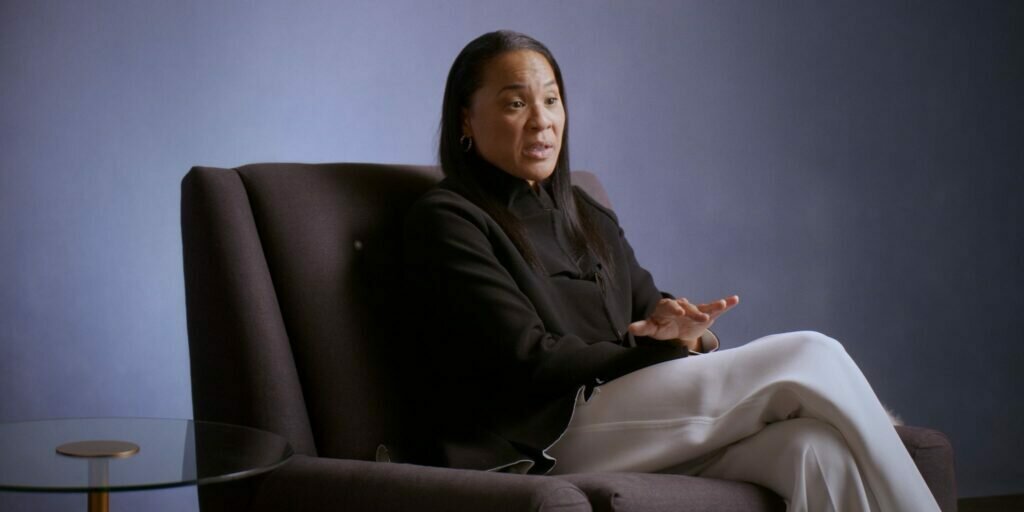The Playbook (Episode 5) – Dawn Staley: A Coach’s Rules For Life.
- Published
- Reading Time
- 7 minutes
- Contents
Jigsaw puzzles are a good metaphor for so many things in life. As Dawn Staley articulates from her growing up with such puzzles (since that’s all her family could afford as gifts);
Building from the ground up. It’s, uh, frustrating and gratifying, ‘cause puzzles can really overwhelm you. But the moment you put one piece into another, it makes you keep coming back to complete the puzzle.
Dawn Staley was showing coaching instincts even through her journey as a player. She would be directing plays on the court all through her career. She picked up 3 Olympic gold medals as a part of Team USA, was a WNBA All Star Player and started coaching right after. She took her own disappointment of not winning an NCAA National Championship as a college player and turned things around as coach of South Carolina. From starting as a losing team, to SEC Championships to Final Fours and to the National Championship, she’s built, and is still building, a grand legacy in Women’s College Basketball, not much different from legends like Coach K at Duke.
Two-time Atlantic 10 Coach of the Year
Four Atlantic 10 tournament titles
Cruising to a record season 32-1 this year, in 2020, she was taking her team to a possible second championship. It took COVID and the season cancellation mid-course to deny her that. From the current US Women’s Basketball National Team Coach, Dawn Staley, here are some lessons.
Rule No 1: BRING YOUR OWN BALL
Growing up, the girls in the ‘hood didn’t play ball. Staley grew up playing with the boys. She also was the youngest of 5 siblings and a 7 member household in a 3 bedroom home in the North Philadelphia projects. It meant fighting for everything you can get. There was always a “big boy” basketball court in the n’hood and that was her fuel – to be on that court!
Recounting the discrimination, she recalls two phrases she most heard:
You need to be a in kitchen somewhere
Go put on a skirt
She always took her own basketball to the court. Sometimes she was the only one who brought a ball that day and she made a rule – if her ball was being used to play, she had to be picked on a team and be on the court. Anything that it takes to win respect. Eventually, it didn’t take a ball, she earned her right to be amongst the first 10 on the floor, one amongst the “big boys”.
Those tricks she picked up in the projects of Philly came in handy in a lifetime of being one of the best players in the game. That hustle on those courts made the boys respect her game and play her harder than they even played the other boys. Her biggest motivator was the desire for them to respect her game.
Rule No 2: GROWTH TAKES PLACE OUTSIDE OF YOUR COMFORT ZONE
A South Carolina freshman speaks of her challenges in practice to Staley. Staley is cold and clinical. She says, you’re going to be that way as a newbie. I want you to be uncomfortable. This is not going to be easy and this is all new. This is normal.
Every first time entrepreneur feels this way – they appoint themselves first amongst equals, the CEO amongst co-founders. They know it expands to Chief Executive Officer, whatever that means. And they get to work. And realize it doesn’t mean shit. It just means that the buck does indeed stop with you. As they grow, through each stage, you can see them evolve and grow as they enter new areas of their Comfort Zone, only to be back to uncomfortable the next morning. The day you get comfortable, it’s over – it’s a lifestyle business or you’re a dead business.
As a young black woman from North Philly in the Univ of Virginia, Staley says she was in the midst of more white folks suddenly than she had seen in her entire life. She became quiet, focusing on basketball, but also seeing her grades suffer and not knowing who to speak with. The Dean pretty much warned her that if the grades don’t pick up, her basketball isn’t going to save her.
But the Dean did leave her with the line “Growth takes place outside of your Comfort Zone”.
Life will keep throwing things that are uncomfortable or make you seem a little different than others, but one can’t afford to see that as a weakness. Simply put, she had to put as much effort in class, as she did on the court. She took her competitive streak to the classroom.
These are the lessons that she uses to drive her young college team players.
Rule No 3: CREATE A HOME COURT ADVANTAGE
Staley lands up in Univ of South Carolina to try and make them a Championship winning team. She realized that the boys basketball + football-frenzied fan base of the college needed to show some love to her team too. Else, no fans, no home support, no motivation to climb these tall mountains.
You can’t attract the best players and talent without fans. This was another reminder of how an underdog small fund like ours at Blume built its brand. We didn’t have money to buy talent – both team and founders who will work with us. But we built fans of our culture and our persona. As Staley puts it, “we mom’d and pop’d it after that” for the first 5 years. She wanted to elevate women’s basketball in a town known for football. We wanted to elevate a home-grown VC-as-a-partner-to-the-founder model in an ecosystem known for big branded VC money.
Attracting a different audience, building a unique community in a college town that was focussed on male college sports took a new approach. Dawn Staley realized and embraced and thrived on the power of crowd energy. Attendance went to record levels – from a thin sliver of the arena to packed courts, within 3 years. Kids like to play in front of crowds. The fans even managed to attract A’ja Wilson, one of the top picks that year in college basketball. The team makes the crowd feel special, the crowd returns the favor, wants the team to succeed and the virtuous cycle plays out.
Rule No 4: THE 24 HOUR RULE
A crushing 1 point loss to Notre Dame in the 2015 NCAA Final Four was hurtful for the South Carolina team – all the memories of Staley’s own loss as a player many years ago in the Championship Finals come rushing back.
[Flashback: Dawn Staley had the final shot and a rebound of the miss in the 1991 NCAA Championship Final. When she missed that and U Virginia lost the game by a shot, she was devastated. She just took forever to get over the loss. She ended up watching it over and over again, getting herself depressed and felt like giving up on basketball.]
A loss can be devastating to a competitive player. If you don’t have the mental capacity to keep moving, it can be tough to recover. AS a coach, she didn’t want a repeat of what she went through. She implemented what was the 24 Hour Rule for her team: Twenty-Four hours from a win or a loss, we move on. We move on.
You have to learn the steps of becoming a national champion, and one of those steps is losing. Momentum doesn’t need to be positive, you could end up having momentum to keep losing. And so, you got 24 Hours to bask in your victory or you got 24 Hours to agonize over your defeat.
Rule No 5: WHAT IS DELAYED IS NOT DENIED
Next year, the South Carolina team survives to win one game, and then a buzzer-beater to win another, then the Final Four, beat Stanford, and enter their First Championship Game in History. What a remarkable story for Dawn Staley who started with nothing on this team and brought it to this stage!
Missing out on the National Championship as a player in 1991 made Dawn Staley bottle up the emotion for the future. Many people would tell her along the journey: What is Delayed is Not Denied. It stayed with her. It became scripture, it stuck with her.
There’s always a heart-warming story tucked away in the larger fairytale endings. A Purdue championship-winning coach gave Staley a piece of the basketball net from her last win, and said she could keep it till she won her own Championship, and then return it. That little piece of rope was the symbol of hope to win the big one. It stayed in Staley’s wallet for 2 years. That hopeful rope helped her be a bit better – on all fronts, during that long quest.
The winning moments are a wonderful sight and emotion to behold in the episode. She cut the net, she cut two pieces, one for herself and another to serve as hope for another coach, who may be close to winning her first championship someday in the future, but needs that little bit of hope and motivation to hold onto.
The execution and the hard work and the preparation, you can’t speed it up, you can’t slow it down. But if you’re able to be patient, you’re going to be successful.
Finale:
Strangely, she didn’t win in college and coaching found her rather than the other way around. Most people say that it was divine intervention when they won something big or got something big. For Staley, that loss in 1991 was divine intervention.
When it (pinnacle of success) does happen, you get to reflect on it all, the people; there’s a village of people that allowed for that to happen. All of those people, they were pieces in my life’s puzzle, that were put in her life for that moment to happen.
Staley’s final advice:
This was hard, but you can do it too. Because …. I’m …. I’m just like you. I’m just like you, in that I’ve failed. I’ve gotten knocked down. So, all of those challenging things happened, but yet … I’m the last woman standing.
We, at Blume, feel the same way everyday. A village of people to make each startup success story unfold. Every piece coming together, as if someone were stitching together a web of serendipity to make it all happen.
This was Episode 5 of the First Season of the Playbook on Netflix. Lot of folks ask me why I write. Much like most folks who do, I write for myself. It’s my way of learning, enjoying what I’ve learnt, internalizing what I enjoy. I hope everyone who read the series of reviews got some pleasure and learning out of it, as I did in writing it. As you can see, each sport is a little different, each sports coaching analogy teaches entrepreneurs on how to take lessons for themselves, their core team, their wider team and build memorable franchises, just like Championship winning teams. Look forward to Season Two of the Playbook. Thanks Netflix.



